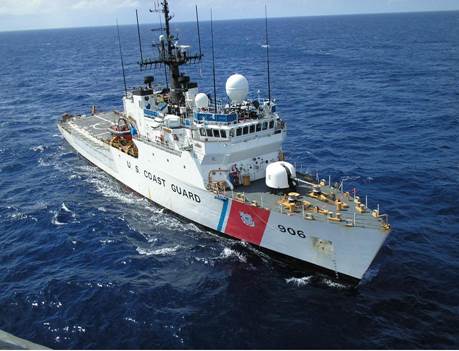The United States Coast Guard has issued a Port Security Advice, stating that Libya is not maintaining effective anti-terrorism measures in all of its ports. This has consequences for vessels that call at Libya and thereafter come to the US.

USCG Seneca at sea (Source: United States Coast Guard)
The development
The US Coast Guard has issued its Port Security Advisory 2-15, republished alongside this advisory, in which it is stated that the USCG has determined that Libya is not maintaining effective anti-terrorism measures in all of its ports.
Should a vessel have Libya as one of its last five ports of call, then this could trigger increased USCG inspection and security measures before permission is given to enter the US and remain there.
In Part C of the advisory, the USCG lists the measures that vessels have to undertake:
QUOTE
All vessels arriving to the United States that visited the countries listed in paragraph B (with exceptions noted) during their last five port calls must take actions 1 through 5 listed below while in the countries listed in paragraph B as a condition of entry into U.S. ports:
- Implement measures per the ship's security plan equivalent to Security Level 2;
- Ensure that each access point to the ship is guarded and that the guards have total visibility of the exterior (both landside and waterside) of the vessel. Guards may be: • provided by the ship's crew, however, additional crewmembers should be placed on the ship if necessary to ensure that limits on maximum hours of work are not exceeded and/or minimum hours of rest are met, or • provided by outside security forces approved by the ship's master and Company Security Officer.
- Attempt to execute a Declaration of Security;
- Log all security actions in the ship's security records; and
- Report actions taken to the cognizant U.S. Coast Guard Captain of the Port prior to arrival in the U.S.
Vessels that visited the countries listed in paragraph B (with exceptions noted) on or after the effective date in paragraph A, during their last five port calls will be boarded or examined by the Coast Guard to ensure the vessel took the required actions. Failure to properly implement the actions listed in paragraph C.1 through C.5 may result in delay or denial of entry into the United States.
UNQUOTE
The Coast Guard has also reminded, in the same advisory, about the imposition of sanctions under UN Security Council Resolution 2146, which targets illicit oil trading from Libya.
In any event, vessels should consult with their flag as to the appropriate level of security to implement when calling at Libya, but given the US Coast Guard announcement, it is prudent to work at Level 2 when at any Libyan port.
Latest Security Update
In the meantime, Skuld's correspondents have advised that at present the following security situation is being experienced at the below listed Libyan ports. It must be stated, however, that the situation in Libya is very fluid and that changes can occur very rapidly without notice. It is therefore very important therefore to continuously check with local and security sources about the latest developments and as always instruct masters to be ready to take action at short notice to prioritise the safety of the crew and vessel.
Ports presently reported as experiencing military and other conflict actions:
- Benghazi
- Derna
- Es Sider
- Ras Lanuf
The Association would need to remind members that this year has already seen at least one incident of an air strike against a foreign vessel, leading to fatalities and injuries. The situation remains very serious, changeable, and unpredictable.
Members are also referred to the overview security advice prepared by the Norwegian Shipowners' Association, and which is republished alongside this advisory with the NSA's kind permission.
Human trafficking and migration
Given the poor security situation in Libya it has become a collecting point for refugees and migrants hoping to cross the Mediterranean and reach Europe. Last year it was estimated that perhaps as many as 200,000 people crossed the seas to Europe and that this year an equal or greater number may attempt the perilous journey. Unfortunately there have already been reports this year of significant tragedies occurring, despite continued attempts - mainly from the Italian Navy and Coast Guard as well as commercial shipping - to save people.
Members who are calling at Libyan ports or passing the seas between Libya and Italy should be prepared for the eventuality that they may come across distressed persons at sea, and in respect of which there would be a legal obligation on vessels to come to their aid. Vessels in the area may also find themselves asked to assist by local and regional authorities including Italian and European Union agencies.
The Association has previously advised in detail on this situation, and the latest update can be found here (with links to further materials): Mediterranean Sea - Refugee ships and IMO guidance.
Should a vessel be asked to assist or come across distressed people at sea, they should render such assistance as is safely possible and contact the Association on an urgent basis.
Further reading
The Association has previously advised on ISPS matters, and members can find further details in the dedicated topic section.
Skuld's detailed guide to the ISPS Code is also available.
For vessel specific enquiries, members are asked to contact their usual Skuld business unit.
The Association is grateful to Charles Whited Jr. of Murphy, Rogers, Sloss & Gambel for contributing to this update with respect to US information.